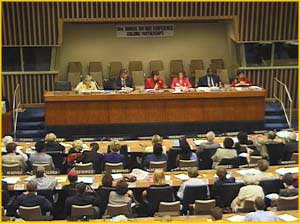THE INTERNATIONAL CAMPAIGN TO REDUCE THIRD WORLD DEBT: (ARCHIVED 1999-2005)
please visit Third World Debt (this page,1999-2000), more debt (2000), march debt (2000-2001) and 2005 Debt.
Although I have archived these, please get involved with these issues.

Sierra Leone family
© Alan Geoghegan
|

|

|
Jubilee Debt Coalition (Drop The Debt) is a coalition of national organisations and local groups around the UK, calling for the unpayable debts of the poorest countries to be cancelled. The Coalition is also known as Jubilee Debt Campaign and focuses on developing countries' debt. They were active between 2000-2005.
The Coalition was formed as a successor organisation to the Jubilee 2000 Coalition. The name was chosen in 1995/6, as preparations were gathering pace for the celebration of the millennium. The concept was that justice and poverty alleviation through the cancellation of debts would be a fitting celebration for the millennium. The concept of debt cancellation and celebration is linked to the Old Testament concept of Jubilee, which meant that every 50 years, people sold into slavery, or land sold due to bankruptcy, were redeemed. The key aim of JDC is debt cancellation and the alleviation of poverty. Educational and campaign materials have been produced on the legitimacy of debt, power and corruption of both lenders and borrowers. (wikipedia.org)
FRANCE TO WRITE OFF DEBTS BY WORLD'S POOREST COUNTRIES From RTE , 18 December 1999
France will write off more than 40 BILLION FRANCS of
debt owed by 28 of the world's poorest countries during 2000 and 2001. The move follows
a promise to help out the world's poorest economies made at the G7 summit meeting.
Britain has also announced that it will wipe the slate clean on the debts of 25 of the world's poorest countries, and called on other countries to follow its lead. Chancellor Gordon Brown revealed the move as the Treasury confirmed it is now ready to forego 100% of bilateral debt with 25 of the world's poorest countries. This follows discussions with the World Bank, the International Monetary Fund and other major countries. The move will see the first four countries start to have their borrowings wiped out by the end of next month.
Gordon Brown said that the British Government was determined to put pressure on the international community to follow suit. The decision follows a similar move by the United States that is aimed at breaking the cycle of poverty in the developing nations. Mr. Brown said that precautions would be taken to see that the money saved was used productively. The announcement was welcomed by charities and by campaigners for debt relief. Bob Geldof, KBE, who has campaigned vigorously for such action, said that it would be remembered far longer than Britain's millennium celebrations.

BONO - REASONS TO BE JUBILANT • From VH1
 |

|
U2 singer Bono is celebrating another victory for his Drop the Debt organization. Gordon Brown, Britain's Chancellor of the Exchequer, agreed to cancel the debt owed by over 20 developing nations, according to web zine Music 365. The chancellor's role is akin to America's Secretary of the Treasury.
Brown issued the caveat that the debt would be canceled only if the money saved was spent on humanitarian needs. He told a British radio station, "It's obviously only a start to completing this process of debt relief and poverty reduction, but it is the important start that I think everyone is looking for. "
"It is no longer a question of people talking about what they are going to do, it is now a question of action."
Drop the Debt, which counts Live Aid founder Bob Geldof among its
number, hailed the move as a significant breakthrough. Geldof said,
"It's an amazing thing to do. We will not be for wheels and Domes and fireworks. I think future generations will remember a very simple and confident gesture like this." Bono said, "I am absolutely delighted. [Prime minister] Tony Blair and Gordon Brown will be remembered for this. I don't think this is going to solve the problem completely but it is going to make a dent in it."
Through its actions, Drop the Debt has also succeeded in getting the Canadian government to cancel $600,000 owed to it by Bangladesh. Drop the Debt has been campaigning with the Jubilee 2000 organization to get all Third World debt canceled. To this end, Bono met with the Pope and Washington legislators and brought his proselytizing skills to bear at the ill-fated NetAid concert. Earlier this year, Bono, Bob Geldof and Radiohead's Thom Yorke joined a protest at the G8 economic conference in Cologne, Germany in June. The pop stars formed a human chain with demonstrators around the venue where the conference was being held. They also submitted a million- signature petition.
At the time, Bono said,"Our goal is to encourage these politicians to go all the way, not some of the way. It's an Everest, if you like, but there's no honor in climbing halfway up, you have to get to the top. If they give in to our demands, there's a chance that 1999 could be remembered not for the destruction of [Kosovo] but for the rebuilding of 52 of the poorest countries in the world. It's the only way to end 1999."At the end of September Bono received more good news when the United States committed to dropping the Third World debt owed to it. President Bill Clinton has agreed on the condition that the developing nations use the money to finance "basic human needs."
The U2 singer professed to be "overjoyed" at Clinton's decision. "It's history, I suppose, that's being made right in front of our eyes." He said, "On the ground in sub-Saharan Africa and elsewhere it's actually life. It's water, roads, hospitals and lives that are not gonna be squandered, that were last week."
Jubilee 2000 have also sponsored a "chain of words" around the St. Martin's in the Fields church in London. The singers have contributed messages to the decoration, with Bono's composed of lyrics he said would appear on the next U2 album. It reads:
|
Bono on how ending poverty
brought together
pontiffs, pop stars and bankers
The TIMES
(UK) Posted Jan 4, 2000
Freetown boy © Alan Geoghegan |
Why the Pope swapped
his beads for my shades

(ok, who took my shades?) U2 @ Live Aid |
Jan 4, 2000: So there it was, the big millennium wave washed over us and where are we in its wake? Is the water any warmer? Around Greenwich perhaps?
The Dome is an extraordinary 21st-century
structure, a miracle of time and materials. It is also a convenient metaphor for
its moment in time, in that it underscores, it screams the question uppermost on
people's minds: "Is there an idea big enough to fill this space?"
Well the biggest idea trapezing through that concave air is still the British-led campaign to cancel the unpayable debts of the very poorest countries to the very richest. It's the biggest idea, because if it continues to catch on over the next year it will substantively touch the lives of about a billion people, the poorest of the poor, those living on less than a dollar a day.
In 1999 a principle was established that forever alters the relationship between the developed and developing worlds. That principle, made flesh in the words and actions of Bill Clinton and Tony Blair last year, decries the repayment of old loans above the feeding, educating and inoculating of a destitute people.
If France, Germany, Japan and Italy follow suit - and the IMF and World Bank make good on their promises - over $100 billion in debt relief will have been agreed, subject to strict conditions. Jubilee 2000 would like twice that, but for now we're celebrating. A movement not given much hope less than a year ago has not just raised consciousness - it has raised the stakes to sums previously unimagined.
Jubilee 2000 has been successful for a few reasons. There's the date. It's a one off. The hysteria has reached its zenith. It demanded a big bang, a big tent. But without a big idea, it's hubris and hangovers we're all waking up with, not a new dawn. And there's its breadth of support; from the Pope to Billy Graham, the TUC to the BMA, Tanzania to Bolivia, from Harvard to The Prodigy.
Above all, Ann Pettifor and Jubilee 2000 have defined this as a justice issue. A lot of these loans shouldn't have been made in the first place, but kept dictators on side in line with old Cold War strategies, for example Mobutu in Zaire. We had to explain the campaign in terms of self-interest (for the West); in a global economy we're interdependent whether we like it or not. Misery causes conflict, war is expensive. Preventative measures are cheaper in the end.
|

UNDPI Conference - video capture by
Alan Geoghegan |
And cancelling debt is sound economics
when the debt is bad and the debtor is bankrupt. What every moneyman knows:
"If your horse falls down and dies,
"
In the US we took a pragmatic approach
and beat out the argument with economists and politicians before we had established
what Bill Clinton later referred to as our "big tent", the threat of pop
stars and popes combined. I personally door-stepped such mythic figures on the economic
landscape as Paul Volker, David Rockefeller, Pete Peterson, Robert Rubin and his
successor as Treasury Secretary Larry Summers. They let me in.
Professor Jeffrey Sachs had half of Harvard
crunching the numbers. His zeal was contagious. Larry Summers made the overtures
and, in the end, Bill Clinton is a star. He saw the light, took out his saxophone
and played. By September, he had moved the American position from 90 per cent debt
forgiveness to the unspinnable 100 per cent. |
Meanwhile on the world stage, Tony Blair and Gordon Brown knew more about debt relief than anyone. In Downing Street they had the head and the heart for it. With Bob Geldof in their ear and church groups blowing trumpets outside the Treasury, the bureaucratic walls were crumbling. Bold and brave moves were made and now the UK, US and Canada lead the world on this issue.
However, we need to get the other major players signed up. Gerhard Schröder has domestic worries but if he can see above them, I believe he has the will to join Clinton and Blair. After all, Germany's resurgence in the last century was cemented by the kind of postwar debt write-off that today's post-conflict countries can only dream of.
Lionel Jospin, the French Prime Minister, has steered France on a steady course and surprised those who thought he would lead his country back to the 1970s. The French have never been afraid of the Big Idea - and they have never forgotten the historical ties that bind them to some of the poorest parts of the world. Niger, Senegal and other Francophone African nations need Jospin's sense of the moment now.
Italy can do this too. The Pope has made this issue his personal moral crusade. Perhaps most important of all is Japan, the new chair of the Group of Seven. Keizo Obuchi can be the man who steers the G7 down the path of promises to reality.
Of course rich countries are not the only lenders. Most of the rest of the debt is owed to the IMF and the World Bank. We need more from these institutions. Jim Wolfensohn, the President of the World Bank, is a passionate man. I believe he will go the distance if the politicians let him. And the politicians will let him if we keep telling them.
Nineteen-ninety-nine was the most extraordinary year for me. I swapped sunglasses for rosary beads with the Pope, tantrums and tiaras for a bowler hat and briefcase and war stories with David Rockefeller at the top of his Center in New York. On the street though, it has given me faith in the rank and file protester and, I have to humbly admit, in the politicians who respond to them.
Bono is the lead singer of U2 and spokesperson for Jubilee 2000. Further information is available from:
Continue to March Debt page
This page was created by Alan Geoghegan in his spare time
Back to Alan Geoghegan's Blog









